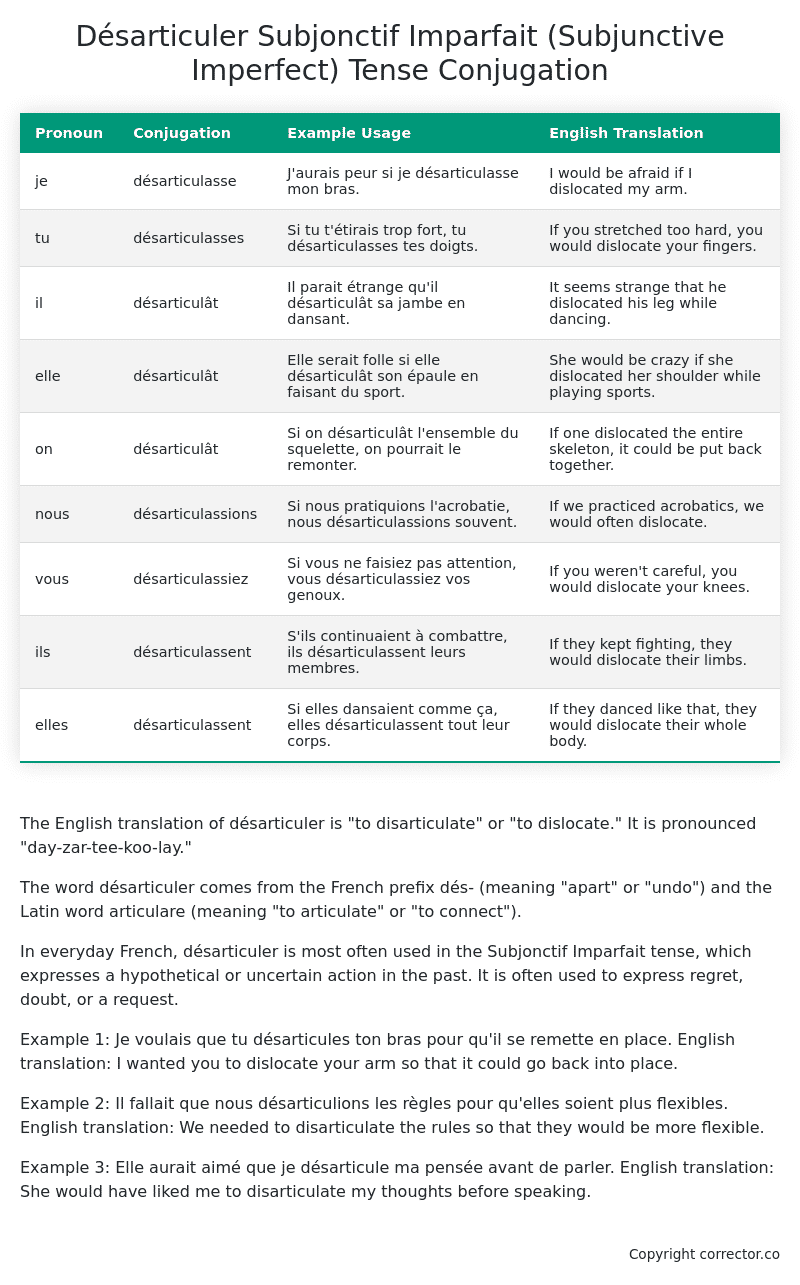Subjonctif Imparfait (Subjunctive Imperfect) Tense Conjugation of the French Verb désarticuler
Introduction to the verb désarticuler
The English translation of désarticuler is “to disarticulate” or “to dislocate.” It is pronounced “day-zar-tee-koo-lay.”
The word désarticuler comes from the French prefix dés- (meaning “apart” or “undo”) and the Latin word articulare (meaning “to articulate” or “to connect”).
In everyday French, désarticuler is most often used in the Subjonctif Imparfait tense, which expresses a hypothetical or uncertain action in the past. It is often used to express regret, doubt, or a request.
Example 1: Je voulais que tu désarticules ton bras pour qu’il se remette en place.
English translation: I wanted you to dislocate your arm so that it could go back into place.
Example 2: Il fallait que nous désarticulions les règles pour qu’elles soient plus flexibles.
English translation: We needed to disarticulate the rules so that they would be more flexible.
Example 3: Elle aurait aimé que je désarticule ma pensée avant de parler.
English translation: She would have liked me to disarticulate my thoughts before speaking.
Table of the Subjonctif Imparfait (Subjunctive Imperfect) Tense Conjugation of désarticuler
| Pronoun | Conjugation | Example Usage | English Translation |
|---|---|---|---|
| je | désarticulasse | J’aurais peur si je désarticulasse mon bras. | I would be afraid if I dislocated my arm. |
| tu | désarticulasses | Si tu t’étirais trop fort, tu désarticulasses tes doigts. | If you stretched too hard, you would dislocate your fingers. |
| il | désarticulât | Il parait étrange qu’il désarticulât sa jambe en dansant. | It seems strange that he dislocated his leg while dancing. |
| elle | désarticulât | Elle serait folle si elle désarticulât son épaule en faisant du sport. | She would be crazy if she dislocated her shoulder while playing sports. |
| on | désarticulât | Si on désarticulât l’ensemble du squelette, on pourrait le remonter. | If one dislocated the entire skeleton, it could be put back together. |
| nous | désarticulassions | Si nous pratiquions l’acrobatie, nous désarticulassions souvent. | If we practiced acrobatics, we would often dislocate. |
| vous | désarticulassiez | Si vous ne faisiez pas attention, vous désarticulassiez vos genoux. | If you weren’t careful, you would dislocate your knees. |
| ils | désarticulassent | S’ils continuaient à combattre, ils désarticulassent leurs membres. | If they kept fighting, they would dislocate their limbs. |
| elles | désarticulassent | Si elles dansaient comme ça, elles désarticulassent tout leur corps. | If they danced like that, they would dislocate their whole body. |
Other Conjugations for Désarticuler.
Le Present (Present Tense) Conjugation of the French Verb désarticuler
Imparfait (Imperfect) Tense Conjugation of the French Verb désarticuler
Passé Simple (Simple Past) Tense Conjugation of the French Verb désarticuler
Passé Composé (Present Perfect) Tense Conjugation of the French Verb désarticuler
Futur Simple (Simple Future) Tense Conjugation of the French Verb désarticuler
Futur Proche (Near Future) Tense Conjugation of the French Verb désarticuler
Plus-que-parfait (Pluperfect) Tense Conjugation of the French Verb désarticuler
Passé Antérieur (Past Anterior) Tense Conjugation of the French Verb désarticuler
Futur Antérieur (Future Anterior) Tense Conjugation of the French Verb désarticuler
Subjonctif Présent (Subjunctive Present) Tense Conjugation of the French Verb désarticuler
Subjonctif Passé (Subjunctive Past) Tense Conjugation of the French Verb désarticuler
Subjonctif Imparfait (Subjunctive Imperfect) Tense Conjugation of the French Verb désarticuler (this article)
Conditionnel Présent (Conditional Present) Tense Conjugation of the French Verb désarticuler
Conditionnel Passé (Conditional Past) Tense Conjugation of the French Verb désarticuler
L’impératif Présent (Imperative Present) Tense Conjugation of the French Verb désarticuler
L’infinitif Présent (Infinitive Present) Tense Conjugation of the French Verb désarticuler
Struggling with French verbs or the language in general? Why not use our free French Grammar Checker – no registration required!
Get a FREE Download Study Sheet of this Conjugation 🔥
Simply right click the image below, click “save image” and get your free reference for the désarticuler Subjonctif Imparfait tense conjugation!

Désarticuler – About the French Subjonctif Imparfait (Subjunctive Imperfect) Tense
Formation
Common Everyday Usage Patterns
Interactions with Other Tenses
Subjonctif Présent
Indicatif Passé Composé
Conditional
Conditional Perfect
Summary
I hope you enjoyed this article on the verb désarticuler. Still in a learning mood? Check out another TOTALLY random French verb conjugation!


